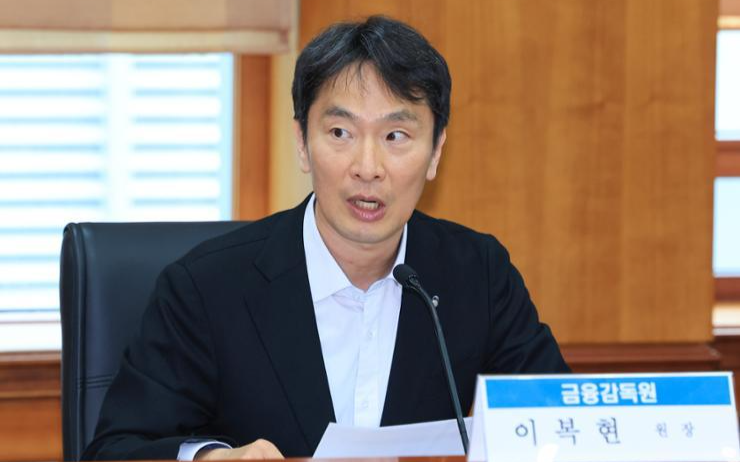Lee Bok-hyun, chief of the Financial Supervisory Service (FSS), speaks to journalists as he arrives to attend a meeting at Lotte Hotel in Seoul, April 15. Yonhap
The head of the financial regulator on Thursday stressed the need for businesses and their shareholders to work together to ensure joint development, saying the government will work to create a virtuous cycle between shareholder activities and business growth.
Lee Bok-hyun, chief of the Financial Supervisory Service (FSS), noted that shareholder activism will only continue to grow, but said efforts by shareholders may end in vain unless they are sound and reasonable enough to be supported by other shareholders.
Shareholder activism refers to efforts by shareholders to influence a firm’s behavior by exercising their rights as stakeholders, often through letter-writing, voting or campaigning for changes.
The financial regulator said out of 93 agenda items suggested by shareholders at various firms this year, only 30 percent have been approved.
“I ask shareholder activist organizations to actively propose ‘long-term growth strategies’ to businesses and other shareholders,” the FSS chief said in a meeting with officials from activist groups, businesses and other related organizations.
“Unreasonable demands that only seek short-term profits will not only undermine the firms’ long-term growth engines but also become an obstacle to the development of the financial market,” he added.
For businesses, the chief of the financial regulator stressed a need to listen.
“To businesses, I ask them to listen to the voice of shareholders and to ‘actively react’ to just demands of shareholders,” Lee told the meeting. “We live in a time where shareholders can directly suggest agendas for shareholder meetings through their smartphone apps. Also, shareholder activism is very likely to expand into various activities, such as calling on firms to fulfill their social responsibilities.”
Lee’s call comes amid government efforts to boost the value of local businesses to end the so-called Korea discount, a phenomenon where local shares are traded lower than their fundamentals.
The FSS chief said the government will closely watch future developments in shareholder activities and firms’ reactions.
“In addition, the financial authorities will work to foster a business-friendly environment to create a ‘virtuous cycle’ where firms can maximize returns to shareholders through continuous growth and shareholders can reinvest their gains in the firms,” said Lee. (Yonhap)


